Acclaim for Sun Shuyuns
THE LONG MARCH
A beautifully told story. Utterly compelling. [Sun Shuyun] is an engaging writer with an excellent eye for detail.
The Guardian (London)
Powerful. [The] devastating account [of the survivors], which comprehensively subverts Maos official version, is a testament to Shuyuns old-fashioned journalistic values.
Nicholas Shakespeare, The Daily Telegraph (London)
Impressive excellent. Subtle [and] layered.
The Observer
A mixture of engaging, lively travel writing and impressive historical reconstruction. Offers a rewarding journey into the experience of people, within living memory, who needed endurance beyond the comprehension of most of us.
Financial Times
Compelling. It may well change the core of modern Chinese history.
Deseret Morning News
Splendidly researched and craftily written.
Kirkus Reviews (starred review)
SUN SHUYUN
Sun Shuyun was born in China in the 1960s. She graduated from Beijing University and won a scholarship to Oxford. She is a film and television producer and has made documentaries for the BBC, Channel 4, and international broadcasters. For the past decade, she has divided her time between Beijing and London.
ALSO BY SUN SHUYUN
Ten Thousand Miles Without a Cloud
FIRST ANCHOR BOOKS EDITION, MAY 2008
Copyright 2006 by Sun Shuyun
All rights reserved. Published in the United States by Anchor Books, a division of Random House, Inc., New York, and in Canada by Random House of Canada Limited, Toronto. Originally published in the United Kingdom as The Long March by HarperPress, London, in 2006, and subsequently published in hardcover by arrangement with HarperPress in the United States by Doubleday, an imprint of The Doubleday Broadway Publishing Group, a division of Random House, Inc., New York, in 2007.
Anchor Books and colophon are registered trademarks of Random House, Inc.
The following photographs are included by kind permission of Chinese Archive
Sources:
Mao presiding at the opening of the First China Soviet Congress
Maos calligraphy, Zunyi Museum
Mao and Zhang Guotao at Shaanxi, 1937
Red Army at Shaanxi, 1937
Bo Gu and others, Shaanxi, 1936
Zhou Enlai, Mao, and others, after Xian Incident
The following photographs are included by kind permission of Hou Baoyu:
The Xiang River
The Red Armys road out of Zunyi
Luding Bridge
The rest of the photographs have been taken by the author.
The Library of Congress has cataloged the Doubleday edition as follows:
Sun, Shuyun.
The Long March : the true history of Communist Chinas founding myth/
by Sun Shuyun.
p. cm.
1. ChinaHistoryLong March. 19341935. I. Title.
DS777.5132.86 2007
951.042dc22
2006052132
eISBN: 978-0-307-48765-0
Author photograph Robert Cassen
www.anchorbooks.com
v3.1
To all the men and women on the Long March
CONTENTS

ACKNOWLEDGMENTS
I am deeply grateful to everyone who helped me on my journey and with this book, especially RHC, ever patient, ever supportive.
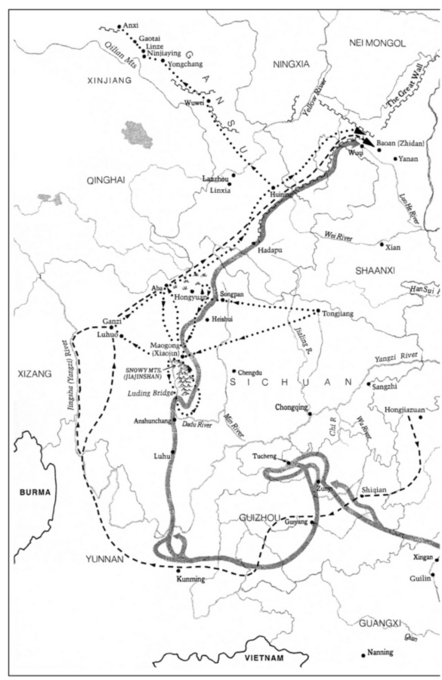
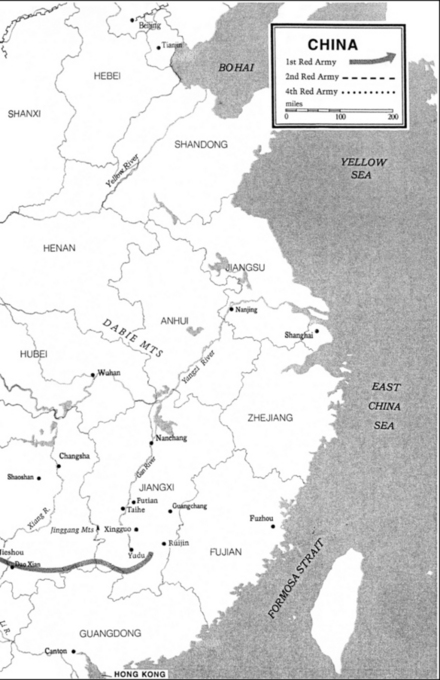

PROLOGUE
I was born to the sound of a bugle in the barracks of the Peoples Liberation Army where my father served; I grew up with stories of his battles. There were plentyhe was in the army for nearly thirty years. He joined up with the Communist troops when he was 16. He often said only they could help the poor in his village. He really felt for the poor. In winter they dropped like flies, he told me.
Father fought his way across the whole of China and helped to defeat the Nationalist government led by Chiang Kaishek, whom he called a paper tiger. On October 1, 1949, when Mao declared on Tiananmen Square that the Chinese people had stood up, my father thought he was finished with fighting. He planned to find a wife, have children, and settle down. But he was called to the Korean War; he told me, We had to show the American imperialists our true colors, otherwise they would shit on our heads and take over our homes. He got shrapnel in his back, and from early childhood, I saw him wearing a leather corset around his waist, like a saddled horse.
Fighting erupted again soon after I was born. The Cultural Revolution became virtually a civil war, employing every weapon except for planes. There were barricades in the streets, rifles, and cannons. Father was no longer with the army, but he was horrified to see our city turning into a battlefield, as if his former life was returning. My grandmother was just confusedshe thought the Japanese had invaded again. To this day I still dream of the battles, whose gunfire I could hear outside our sandbagged windows.
It was not Fathers personal stories that impressed me most. He talked about his experiences at war only when I begged him to. For him nothing was more exciting and revered than the Long March. Father was too young to take part in it, but his senior commanders were all veterans of the March. The battles we fought were like childs play compared with theirs; the hardships we encountered were small dishes, he told me. The Marchers were outnumbered by their enemies one to a hundred, and they had nothing to eat but leather and grass. Yet they won! It was a miracle.
As I started school, I began to understand the message hed tried to drill into me: If you find it hard, think of the Long March; if you feel tired, think of our revolutionary forebears. Surely nothing compares in difficulty with the Long March. In 1934, the fledgling Communist Party and its Red Armies, some 200,000 strong, were driven out of their bases in the South by Chiang Kaishek. Pursued, blocked, and harried by their enemies, they chose the only way outto go where no one could follow, over mountains higher than birds could fly, across rivers where all the boats had been burned, through swamps and grassland death traps. It was Mao who steered the course from victory to victory. After two years of incredible endurance, courage, and hope against impossible oddsand a march of 8,000 milesthe Red armies reached the barren Yellow Plateau of northwestern China. Only a fifth of those who set out arrivedworn out and battered, but defiant. In just over a decade, they had fought back and launched the new China in the heat of revolution. In Maos own words:
Has history ever known a long march to equal ours? No, never. The Long March has proclaimed to the world that the Red Army is an army of heroes. The Long March has sown many seeds which will sprout, leaf, blossom, and bear fruit, and will yield a harvest in the future. In a word, the Long March has ended with victory for us and defeat for the enemy.


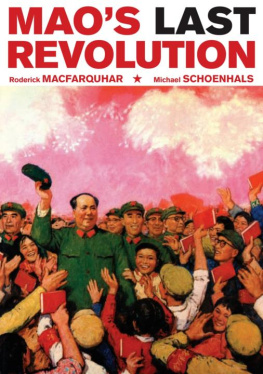
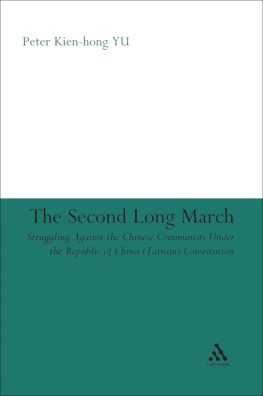
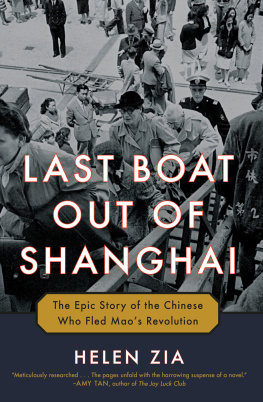
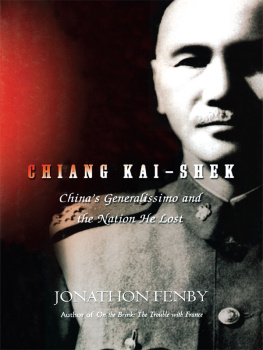
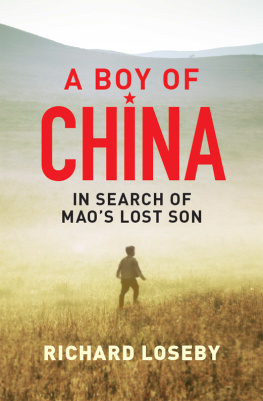
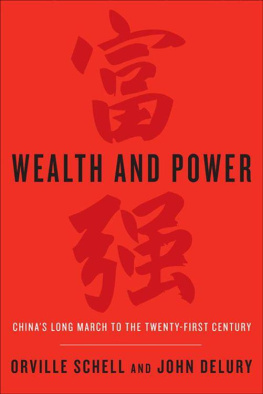
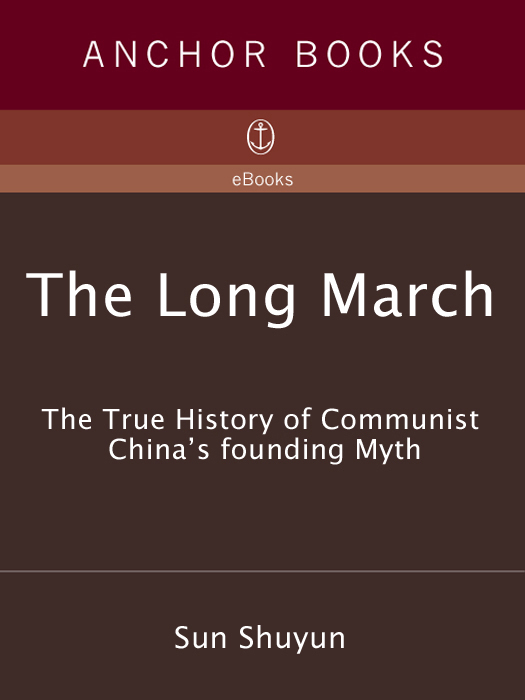
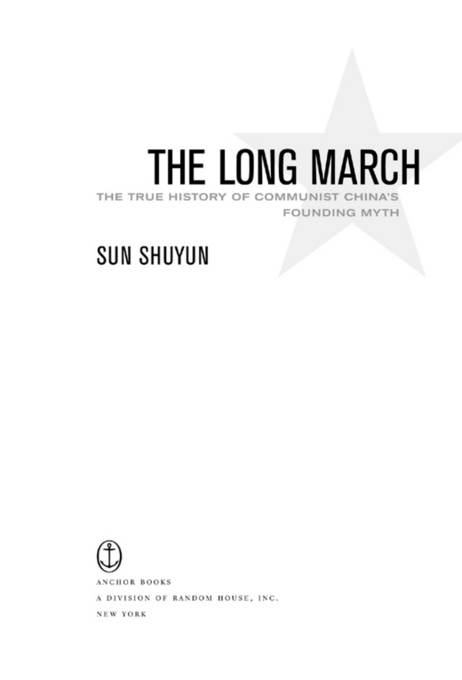
 ACKNOWLEDGMENTS
ACKNOWLEDGMENTS
